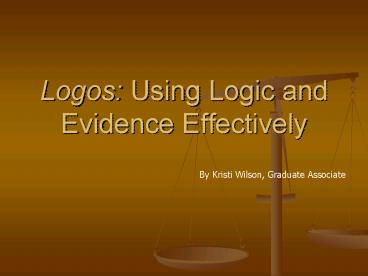Logos: Using Logic and Evidence Effectively - PowerPoint PPT Presentation
1 / 12
Title:
Logos: Using Logic and Evidence Effectively
Description:
All arguments require a claim and justification, or support. ... Ramage, John D., John C. Bean, and June Johnson. Writing Arguments: A Rhetoric with Readings. ... – PowerPoint PPT presentation
Number of Views:51
Avg rating:3.0/5.0
Title: Logos: Using Logic and Evidence Effectively
1
Logos Using Logic and Evidence Effectively
By Kristi Wilson, Graduate Associate
2
RHETORICAL PROOFS
- All arguments require a claim and justification,
or support.
- Rhetorical proofs are types of support.
- Three types of rhetorical proofs
- Ethos ethical appeal (authors credibility)
- Pathos emotional appeal (audiences emotion)
- Logos logical appeal (audiences reason)
3
WHAT IS LOGOS?
- What are the various types of logical proofs we
can use in an argument?
Statistics/data (incl. surveys, interviews, etc.)
Definitions
Deductive reasoning (x, y, and z, are
true therefore I conclude ____.)
Inductive reasoning (I claim ____ because x, y,
and z.)
Analogies (historical, literal)
Hypothetical examples predicted outcomes
ALWAYS EXPLAIN THE CONTEXT OF YOUR EVIDENCE
AND/OR PROVIDE ANALYSIS/INTERPRETATION!
4
WHEN FACTS ARE AT ISSUE
- How can facts be at issue? Arent facts beyond
question?
- Facts might be interpreted differently based on
values, beliefs, biases, preconceptions, goals,
etc. Therefore, using facts is an ethical act.
- Ask questions about your issue this will
require putting aside what you think everyone
knows and thinking critically about the issue
5
GET YOUR FACTS STRAIGHT
- Be sure to clarify terminology to avoid conflicts
over facts (e.g., welfare example in Weston, p.
138)
- When the facts are uncertain, looking deeper
is necessary (Weston 138). Why?
- Evidence is always required dont tell me its
a known fact. Show me the evidence!
6
A WORD ON SOURCES
- In order to use facts in an authoritative and
convincing way, we must be explicit and specific.
- Cite trustworthy sources
- Use plentiful and specific statistics and/or
examples
- Explain the context and interpret the data
- Use sound reasoning
7
LOGICAL STRUCTURE
- Claims are supported/justified by reasons
(because/therefore)
- Effective logical appeals (logos) require more
than just the facts you must be sure you
present your evidence using a clear, logical
progression and sound reasoning
8
ASSUMING THE OBVIOUS?
- All claim/reason pairs have unstated assumptions
(a.k.a. warrants) which allow the reader and
writer to make the logical leap between the
reason and the claim
- If the audience doesnt share the assumptions,
the argument will be ineffective. Be sure your
audience shares your assumptions.
(Turn to examples in exercise on p. 90)
9
AUDIENCE-BASED REASONS
- Arguments are more effective when they take the
audiences goals, values, and motivations into
consideration.
(See examples in exercise on p. 104)
- For a list of questions to help you determine how
best to approach your audience, see p. 105.
10
CORRELATION TO CAUSE
- According to Weston, to make an effective causal
argument, we must
- cite accurate correlations
- explain how the (proposed) cause leads to the
(proposed) effect and - argue that the proposed cause-effect relationship
is the best explanation of the correlation.
11
CORRELATION TO CAUSE
- Correlations can be explained in a variety of
ways. Test these various scenarios against your
issue to determine its relationship to
globalization
- X is an effect of globalization
- Globalization is an effect of X
- X is an effect of globalization and globalization
is an effect of X - Globalization and X are both an effect (or cause)
of Y or - Globalization and X are coincidental and have no
causal relationship.
12
CORRELATION TO CAUSE
- A good argument about causes or effects must
both explain how the proposed cause could lead to
the proposed effect...and it must try to show
that the proposed explanation is the best or most
likely explanation of the observed correlation
(Weston 143-44).
Sources Ramage, John D., John C. Bean, and June
Johnson. Writing Arguments A Rhetoric with
Readings. New York Pearson, 2004. Weston,
Anthony. A 21st Century Ethical Toolbox. New
York Oxford UP, 2001.






























